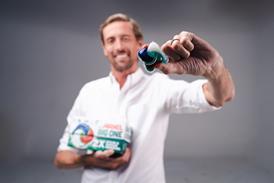Although food by the scoop is a relatively rare convenience store offering, retailers who have introduced loose products are extremely keen. Mark-up and margins are high, and the lack of packaging means that both financially and environmentally, food by the scoop ticks all the boxes.
Offering customers self-serve food with no packaging can also give stores an edge over the multiples, who would struggle to keep these areas clean and attractive.
Nigel Dowdney, an independent retailer in Stalham, Norfolk, introduced a range of loose frozen foods to differentiate his store from a new supermarket that had opened across the road. He now sells a variety of loose food including frozen fruit and vegetables, paella, roasting potatoes and croissants.
Nigel was first introduced to the concept when visiting a farm shop in Cornwall and decided to look into introducing a similar range in his own store. “I contacted a company called Field Fare and they sent a rep to see me,” he says. “He wasn’t sure how it was going to go because they hadn’t put it into a convenience store before. But it’s been in our store for 14 months and has been a huge success. We expected to re-order once a quarter but it’s taken off so well that we’re re-ordering once a month and sometimes every three weeks.”
Nigel says his customers like being charged individually for products so they can buy as little or as much as they want. “It’s quite a big step for a convenience store because it’s not the normal offering. But because of the credit crunch, there’s been an increase in sales of frozen food and people are buying less. Loose products mean that customers are able to control their portions really easily,” he says.
Dike & Son in Stalbridge, Dorset, has had a similar success story. Manager Adam Vincent says that the loose frozen food is particularly popular with older customers, who sometimes come in two or three times a day to buy individual portions and enjoy the social interaction with staff. The store currently has four freezers that hold 36 different lines, from cranberries and chestnuts to individual Yorkshire puddings and loose chips – which is one of their best sellers.
When Catherine Conway opened Unpackaged in November 2007 she wanted to give Islington’s consumers a local shop with a difference. The London store stocks all the grocery essentials, such as fresh fruit and vegetables, herbs and spices, tea, coffee and household products, but at Unpackaged, the customers are encouraged to bring their own containers.
Catherine first tested the concept by selling at markets for a year and then decided there was enough consumer interest in purchasing groceries without ‘unnecessary’ packaging.
The range has now increased from about 35 lines to more than 100, and there are plans to diversify further still. Catherine sells products by weight and offers a 50% discount for customers who bring their own containers. If customers forget, they can purchase a one-off reusable container.
“We sell everything you can get in a local store but the difference with us is that we sell packaging-free, organic and environmentally-friendly products,” says Catherine. “We’ve built a loyal base of customers and have great repeat refill business.”
Unpackaged has strict codes for its suppliers and stocks only organic and Fairtrade products where possible. It doesn’t stock any products that are air-freighted and gives preference to suppliers that are co-operatives and social enterprises. Catherine says the list of her suppliers is huge, but most are local individual producers.
The concept has attracted the media’s attention and the store has been featured on television and in the national papers. Unpackaged has also been shortlisted for The Observer’s Ethical Awards 2008.
Catherine now hopes to open more shops and says the products are affordable and compete with supermarket pricing, so they’re not just “the reserve of rich people”.
She says there’s no reason why traditional c-stores can’t embrace the concept, adding: “We want to make it easy for our customers to do the right thing – the right thing for themselves and for the environment.”
“For the older generation it’s a perfect meal solution because it’s extremely reasonably priced. They can come and buy something different every day of the week and not have to stock up their freezer,” says Adam. “It’s been massive from day one as it suits everyone – from people on diets, to people in catering who want to see the quality of the frozen products they’re buying.”
Dike & Son supplies customers with freezer carrier bags which can be put straight into the microwave. Customers are enticed into the area by a selection of chest freezers at different heights, sprayed in the shop’s colours. “We have a bank of freezers down the back and side of the store which are full height, surrounded by low-level chest freezers,” says Adam.
“The open space invites people into the area and makes them inquisitive. If you walk around your typical supermarket you have rows and rows of full height freezers and it’s mundane. Although I’m sure the multiples would love to offer food by the scoop, they haven’t got the staff there to make sure it looks nice. After all, the supermarkets struggle to keep cucumbers topped up on their shelves.”
Food by the scoop does require some looking after, as Adam reveals: “I have two really good members of staff who take pride in it, because it needs to be rotated and mixed.
Basically, it needs to be loved and cared for. Just like pick ’n’ mix sweets, people like mixing it and before you know it you have your broad beans in with your strawberries.”
Sally Stringer, who runs Beckford Stores in Devon, issues a similar warning. “You have to be professional about how you do it – there are some people who shove the products in and don’t bother to look after them.”
Sally has been stocking loose frozen fruit varieties, such as Antigua and California mix, for three years, but has seen an increase in sales over the past few months. She says the economic downturn has meant her customers are less attracted to supermarket offers and are being more discerning in their requirements.
“It gives us one up on the multiples because people can buy the exact amount they want. Someone came in and wanted six strawberries for a recipe she was making and that’s exactly what she bought,” says Sally. “I think the credit crunch is really starting to take hold and people are telling me that they’re not buying the buy-one-get-one-frees in the supermarket any more. They’re starting to think about exactly what they need day to day.”
Playing hard to get
While some retailers are finding food by the scoop profitable, locating a supplier isn’t always easy. Agra Freeze, which trades as Field Fare, supplies loose frozen fruit, vegetables, seafood, bakery products and stir-fry ingredients, as well as freezer-proof poly bags, scoops and display boxes. But it has concerns about whether the convenience sector is always a good fit for it.
Field Fare director Karen Deans says the company is very choosy when deciding who can stock its lines. “We mainly supply specialist and farm shops – they’re are all owner-managed and we’re confident they’ll look after the section. It has to be looked after, otherwise it simply doesn’t work,” she says.
The company’s website reiterates the importance of strict standards. “As the customers are buying with their eyes,” it says, “it’s important to keep the product looking at its best.” The website adds that loose products should be stirred daily to prevent them from sticking, and boxes should not be filled higher than 15cm from the top. It recommends a minimum of two freezers to encourage repeat purchasing and the company can provide additional storage freezers.
Food safety can also be a concern, and Field Fare recommends that the lot number of each case of product emptied into the freezer is recorded and then updated when the product is re-filled, with the appropriate new lot number also recorded to provide traceability. Scoops and tongs should be regularly washed throughout the day and the temperatures in freezers and cold stores should be checked and recorded daily. Freezers should be defrosted routinely to prevent the excessive build-up of ice around the edges.
But food safety isn’t the only concern for Deans, who says she would be wary about entering the convenience sector if it was to the detriment of her existing customers. “We would shoot the farm shops in the foot if we started to supply a number of convenience stores,” she explains.
Adam from Dike & Son says he practically had to beg Field Fare to consider his shop: “They’re very particular about who they supply, but once you’re in the door they’re a very good company to do business with. They’re very protective of their brand and when I asked if they would be willing to come and see us, they saw us in our old store and it was hard for them to share our vision.”
Adam eventually won Field Fare over, but there seems to be a gap in the market for a loose foods supplier to the convenience sector. The Frozen Fruit Company says there is a “huge opportunity” in rolling into convenience and plans to introduce its frozen loose fruits into the channel next summer. Marketing manager Rachel Borg says the company wants to encourage shoppers to use the fruit for home-made smoothies, pies and jams.
But like Deans, Borg warns retailers that if they’re considering going down this route they have to make sure they’re willing and able to look after the freezers.
“The trouble is you’re putting your trust in the shop owner and their staff to ensure that freezers are kept clean and in the manner you want,” she says. “With fruit you can get fruit flies and mould if the freezers aren’t kept clean. You have to make sure the retailers have the training to keep the area hygienic and safe.”
















No comments yet